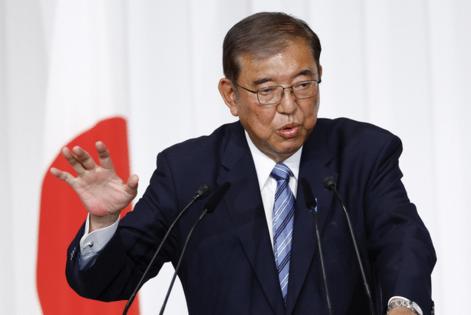Ishiba vows to stay as Japan leader despite election setback
Published in Political News
Japan’s ruling coalition looked set to lose its majority in the upper house, according to exit polls, an outcome that would further weaken embattled Prime Minister Shigeru Ishiba’s leadership and potentially unsettle markets.
A poll by public broadcaster NHK showed that the ruling coalition is set to secure about 32-51 seats of the 125 up for grabs in Sunday’s election, likely leaving it short of the 50 needed to maintain a majority in the 248-member chamber. The Asahi newspaper estimated that Ishiba’s Liberal Democratic Party and its junior coalition partner Komeito would win 41 seats combined. Nikkei said the bloc is expected to lose a significant number of seats, without giving an estimate.
Ishiba indicated that he would stay on as leader despite the loss of seats, arguing that the LDP is poisted to remain the largest party in both houses. Asked in separate TV interviews Sunday if he would continue as prime minister, Ishiba said “That’s right.”
“I continue to have a number of duties I must fulfill for the nation, including achieving wage growth that exceeds inflation, achieving gross domestic produce of a quadrillion yen, and responding to an increasingly tense security environment,” Ishiba said. “Though the votes are still being counted, we do seem to have won the most number of seats out of the parties.”
Still, a loss of control of the upper house would make Ishiba’s administration the first LDP-led government to rule with a minority in both houses of parliament for the first time since the party’s formation in the 1950s. It would mark the second straight election setback for Ishiba following a poor result in the lower house shortly after he took office.
The outcome threatens to throw his policy agenda into further disarray, complicate trade talks with the U.S. and potentially cost him his job. The last three LDP prime ministers who lost an upper house majority stepped down within two months, including Shinzo Abe in 2007 during his first stint as premier.
A lost majority for the ruling parties would also ramp up uncertainty for investors already concerned that a further weakening of Ishiba’s leadership will nudge the coalition into giving concessions to opposition parties, including tax cuts. Market players have expressed increasing concern over the ability of lawmakers to rein in spending, one factor that has helped push yields on Japanese debt to the highest levels in more than two decades.
Stock and bond markets will be closed for a national holiday on Monday in Japan. The yen will be trading from early in the day, offering a first indication of how investors are digesting the election result.
“This is a harsher result than the prior forecasts indicated,” said Yusuke Matsuo, senior market economist at Mizuho Securities Co. The ongoing uncertainty if Ishiba stays on will weigh on stocks, Matsuo added, while they would rise if the prime minister steps down and there’s a higher chance of a sales tax cut.
Japan’s main opposition leader, Yoshihiko Noda of the Constitutional Democratic Party, ruled out forming any kind of coalition with the LDP. He said he’d consider whether to submit a no-confidence motion in the lower house after hearing what Ishiba says at a press conference likely to take place Monday.
“It seems clear that, for Ishiba, continuing in his role will be an exceptionally challenging prospect under the current circumstances,” said Chihiro Okawa, political expert and professor at Kanagawa University. “When it comes to the question of who would take over leadership at this point, it becomes a matter of ‘picking chestnuts out of the fire’ — an extremely risky and undesirable task. It’s entirely possible that no one will be eager to step into such a precarious position.”
Polls closed at 8 p.m. local time following an election campaign centered on simmering discontent over rising prices. Wages are failing to keep up with inflation in a nation that had no real experience of rising prices for more than a decade, leading to a surge in votes for smaller parties — including a right-wing upstart touting a “Japanese First” agenda.
The less powerful upper house can’t appoint a prime minister, hold a no-confidence vote or stop the passage of a budget. But it can delay or block other legislation, potentially leading to gridlock in the policymaking process.
While nearly all opposition parties have argued that the sales tax should be lowered to help relieve the strain on households, Ishiba’s government has said one-off cash handouts are better because they have less impact on the nation’s finances. A lost majority would leave him needing further support from opposition parties to pass legislation, putting him under pressure to make some kind of concession on the sales tax.
The fight over spending comes as Japan faces an Aug. 1 deadline to strike a deal with U.S. President Donald Trump before across-the-board tariffs on exports to the US jump to 25% from 10%. Such a move would reduce Japan’s gross domestic product by 0.9% over the medium term, according to Bloomberg Economics. Japan is also facing calls from Trump to further boost defense spending.
The NHK exit poll showed the leading opposition CDP projected to win 18-30 seats, likely more than the 22 seats it held before the election. The party is calling to exempt food from the sales tax for as long as two years.
The same polls showed that the small populist Democratic Party for the People is likely to win 14-21 seats, up from four now, as it appeals to younger voters seeking more take-home pay. Sanseito could win 10-22 seats, a huge leap from the single seat it held before.
_____
(With assistance from Akemi Terukina.)
_____
©2025 Bloomberg L.P. Visit bloomberg.com. Distributed by Tribune Content Agency, LLC.

























































Comments